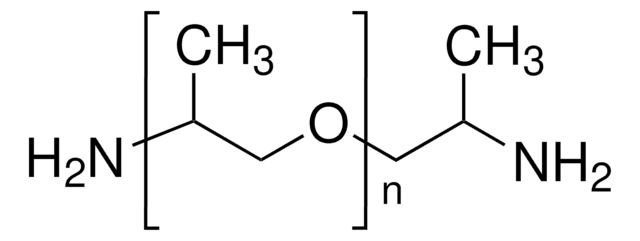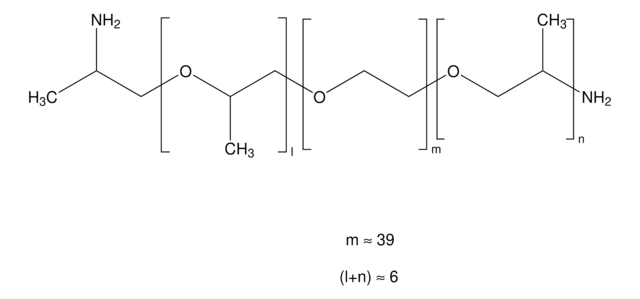406651
Poly(propylene glycol) bis(2-aminopropyl ether)
average Mn ~230
About This Item
Recommended Products
form
liquid
mol wt
average Mn ~230
refractive index
n20/D 1.447
density
0.948 g/mL at 25 °C
SMILES string
CC(N)CO.CC(O)CO
InChI
1S/C4H9NO2/c6-3-1-5-2-4(3)7/h3-7H,1-2H2
InChI key
JCZPOYAMKJFOLA-UHFFFAOYSA-N
Looking for similar products? Visit Product Comparison Guide
Related Categories
General description
Application
- To passivate the trap states(surface and grain defects) in perovskite solar cells. PEA helps to improve the stability and efficiency of devices.
- To fabricate nanocomposites for CO2 capture. The ether group of PEA acts as a proton acceptor that helps to improve the thermal stability and amount of CO2 captured.
Signal Word
Danger
Hazard Statements
Precautionary Statements
Hazard Classifications
Aquatic Chronic 3 - Skin Corr. 1C
Storage Class Code
8A - Combustible corrosive hazardous materials
WGK
WGK 2
Flash Point(F)
262.4 °F - closed cup
Flash Point(C)
128 °C - closed cup
Personal Protective Equipment
Certificates of Analysis (COA)
Search for Certificates of Analysis (COA) by entering the products Lot/Batch Number. Lot and Batch Numbers can be found on a product’s label following the words ‘Lot’ or ‘Batch’.
Already Own This Product?
Find documentation for the products that you have recently purchased in the Document Library.
Customers Also Viewed
Our team of scientists has experience in all areas of research including Life Science, Material Science, Chemical Synthesis, Chromatography, Analytical and many others.
Contact Technical Service
![Trimethylolpropane tris[poly(propylene glycol), amine terminated] ether average Mn 440](/deepweb/assets/sigmaaldrich/product/structures/186/658/1b1d510a-705a-4bfd-b90a-9dec80d64467/640/1b1d510a-705a-4bfd-b90a-9dec80d64467.png)






